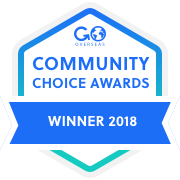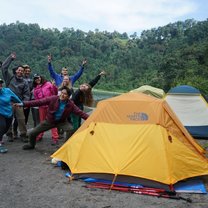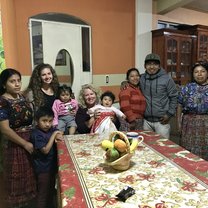THE BAD
The GPSA medical fellow program is relatively new (within the last 5 years), and it suffers certain organization growing pains that are natural to any new organization. In particular, difficulties often exist with the rate at which serious complaints about the program are received and handled. This is mostly due to the structure of the organization and the physical distance in between those on the ground and key decision makers. For example, unlike most volunteer organizations in which volunteers are geographically located in the same place as their volunteer coordinators, medical fellows are located in rural pueblos and their coordinators are located in the nearby city of Xela. Because of this, when a medical fellow does have a difficulty with something in the community, it can sometimes be difficult for those difficulties to be communicated effectively and resolved quickly.
Problems also exist given the business model of the organization. The business model of GPSA is entirely oriented around the programs it sponsors for high school students, and the role the medical fellow have in that model is to act as a chaperone during those programs. The actual volunteer work medical fellows do on the ground between programs is almost entirely separate from this model. As such, the interest of programs almost always dominates the interest of the volunteer experience. This prioritization is mostly clearly apparent by the way in which medical fellows are consistently pulled away from their work-sites to participate in programs, often for weeks a time, making it difficult to have a project that is consistently represented on the ground. As GPSA continues to add programs to its calendar--something it is highly incentivized to do given its business model--there is not something obvious thing stopping most of the time spent by medical fellows being allocated to programs and very little on actual volunteer work. As such, if one is interested in being a medical fellow, one should be as directed as possible at the very beginning to ask what percent of one's time will be spent in their work-site as opposed to on a program and perhaps even more importantly when that time will be scheduled (e.g. will it be for one large chunk at a time or more sporadic), which has a lot of influence on the type and scale of project that can be conducted.
A few comments could be made about the actual volunteer experience. As set up, the volunteer experience is broken up into three processes: (1) the process of performing a community needs assessment, (2) the process of preparing your project proposal, (3) the process of carrying out your project. Throughout these processes (especially the first one), the medical fellow is encouraged to build relationships at the clinic or nearby institutions so as to inform what their project may ultimately be. This can be a very challenging process depending on the community the medical fellow finds themselves in and their confidence with the culture and language. Indeed, little cultural training is given at the beginning of the program, leaving the situation such that you as a medical fellow are a foreign student who would like to help, but knows very little of the culture and language and sometimes is not very welcomed in the work setting because of that. However, two points could be made as a response to this criticism: (1) first of all, the particular cultures of various pueblos are very different, and it would be difficult to perfectly prepare medical fellows for the nuances of their specific communities; (2) secondly, there have been a number of medical fellows who have nevertheless been very warmly received into their communities and immediately connected with individual stakeholders in the community who wish to assist them on potential projects. But this second point is not guaranteed, and I don't believe GPSA does a great job ensuring the probability that this warm welcoming is high. Most of GPSAs institutional interaction in Guatemala is through the ministry of health, an organization located in Xela which has little direct contact with the individual Centro de Saluds in the work-sites of medical fellows. This, I believe, creates one layer of institutional barrier between GPSA and local knowledge of the needs of those work-sites. GPSA should work to define relationships with the community stakeholders such as the municipality so that the community doesn’t look at the volunteers as outsiders because they are already familiar with our organization. To be sure, this process may be happening bit-by-bit as generations of medical fellows work in the same community, but during that process some medical fellows are inevitably left as “guinea pigs” to develop all those relationships for the very first time. In short, sometimes there are obvious projects for medical fellows to begin working on spearheaded by local communities leaders, and other times the onus is much more on the individual medical fellow to create those projects from scratch, hoping that something reasonable and meaningful can manifest itself in the time given.
And, moreover, while there are things such as a community needs assessment and project proposal set in place to guide the process of getting to know one’s community and developing a meaningful project, the stringency with which these reports need to be done is very minimal; there is very little oversight. As such, the research component is largely something that is good as you want to make it. Indeed, the GPSA volunteer experience as a whole is largely what you make (as opposed to, for example, a lot of top-down organizational pressure), and the actual projects that medical fellows carry out vary substantially. In a good sense, this reflects the variety of interests that medical fellows have and how they pair those interests with specific needs in the community. On the other hand, it reflects the lack of programmatic infrastructure that GPSA has in its partner communities. This could all be summarized as following: GPSA is a new organization with little organizational infrastructure making the quality of the volunteer experience highly variable and highly dependent on the spontaneous relationships formed within the community. However, to be sure, as the organization grows and learns from its failures and builds stronger (more sustainable) partnerships with its communities, there is strong reason to believe that the volunteer experience will be much more consistently great.
THE GOOD
The best part of the GPSA, in my opinion, has been the elements of cultural exchange (despite the minimal cultural training), the opportunities to explore the country, and the personal growth that necessarily comes when one is thrown out of their comfort zone so radically. It is truly an incredible thing to become part of another family of a different culture--to laugh with them, to go on adventures with them, to share meals with them. Without getting too pithy, as a medical fellow you will learn so much about both the complexity and beauty of human culture, finally being forced to experience it as a foreigner. Secondly, Guatemala is an incredibly beautiful country--lush mountainsides punctuated by hot springs and volcanic lakes--making the opportunities to explore and experience that beauty unquenchable during your year as a medical fellow. I will never forget some of the sights I've seen from the tops of Guatemalan Volcanoes--they almost single-handedly made the whole year worth it.
I said earlier that the volunteer experience can be incredibly varied. This, of course, leaves room for truly wonderful experiences in which the project developed is something the Medical Fellow is passionate about, it responds to a real need in the community, and specific members of the community are enthusiastic about helping the medical fellow accomplish said project. While I don't think that all medical fellows can say that that ideal describes 100% of their volunteer experience, I don't think there has been a Medical Fellow that would say they haven't at least done a few activities in which all three of those factors aligned.
GPSA is also generous insofar as they provide you with Spanish classes during your first few months on site. While my lack of Spanish going into the program was certainly a handicap during the first many months, I am also most satisfied with the amount my Spanish has grown since coming the country and it will likely be the most "professionally applicable" thing I take away from my time.
Moreover, while perhaps born out of a need created by a lack of institutional relationships, the task of the medical fellows personally creating partnerships with community stakeholders could be considered a positive. Not only does it help you submerge with your community because community members then see you’re willing to help and put in the work, but it also helps develop your Spanish by forcing you to have such conversations. Additionally, it gives you the opportunity to work with other organizations within the community that GPSA as an institution does not often consider (for instance, various groups in the municipality that don’t directly focus on health in the same manner as the Centro de Salud does).
Finally, while organizational difficulties exist, the actual staff of GPSA are incredibly kind and caring individuals who I do believe are doing their best to improve a young organization. A medical fellow should hardly need to worry that their complaints and difficulties are not being heard or understood, even if it nevertheless takes some time for them to be resolved.








Response from Global Public Service Academy for Health
Karl, thank you for taking the time to write such a thoughtful review! After a year getting to know you we would not have expected any less ;)
I just wanted to touch on a few of points:
1. Training for Medical Fellows: you would be happy to know that we have implemented new cultural sessions for our current fellows and will continue training for all staff in almost a monthly basis.
2. Programs for high school students: we try to be very clear about this aspect of the Medical Fellows program from the beginning, though knowing ahead of time what the schedule would be like for a specific fellow is in most cases impossible. However, you would also be happy to know that as GPSA is able to host more fellows, the time each fellow will need to spend on programs for HS students will be less, meaning that they will have more time to dedicate to their volunteering projects.
3. GPSA's community partners: our main connection to the local communities indeed comes through the Ministry of Health, who have their own way of supervising the work of Centros de Salud and prioritizing their needs. As an outsider organization, we do not want to step beyond what they already have in place.
While it might have been a challenge to integrate into your community, I would say that you did very well and left many strong connections that future fellows will be able to continue. Thanks for that valuable contribution to our work!
Finally, I just wanted to say that we enjoyed working with you a lot, and we always appreciated your honesty and critical thinking.
Best wishes for your future endeavors,
Gabriela~